Posted on March 15, 2017 by The Orwell Prize -

Submitted Articles
- Irrational, unhinged, gullible? No, out supporters deserve to be listened to– The Guardian,26/02/2016
- Trump supporters are not the bigots the left likes to demonise– The Guardian, 13/05/2016
- We are living in a country so imbalanced, it has effectively fallen over- The Guardian, 24/06/2016
- Does the left have a future? – The Guardian, 06/09/2016
- Why people vote for Trump: the death of the American dream (video)– The Guardian, 12/05/2016
- EU referendum: welcome to the divided, angry Kingdom (video) – The Guardian, 22/06/2016
Posted on March 15, 2017 by The Orwell Prize -

Submitted Articles
- Britain’s shame: the people who are homeless, even though they’re in work– The Guardian, 20/12/2016
- Treated like dirt, these teaching assistants have become the lions of Durham– The Guardian, 06/09/2016
- Burning anger in the land of Nye Bevan: why a Labour heartland is backing Brexit– The Guardian, 07/06/2016
- How Boots went rogue– The Guardian, 13/04/2016
- Creating child poverty for a whole new generation. Take a bow, Theresa May– The Guardian, 01/11/2016
- Your new iPhone’s features include oppression, inequality – and vast profit– The Guardian, 20/09/2016
Posted on March 15, 2017 by The Orwell Prize -

Submitted Articles
Posted on March 15, 2017 by The Orwell Prize -

Nick Cohen is a columnist for the Observer, and writes for the Spectator, New European, Washington Post, Standpoint and many other publications. He is the author of five books, including What’s Left and You Can’t Read This Book
Posted on March 15, 2017 by The Orwell Prize -

Submitted Articles
Posted on March 15, 2017 by The Orwell Prize -

Submitted Articles
Posted on March 15, 2017 by The Orwell Prize -

Submitted Articles
Posted on March 15, 2017 by The Orwell Prize -
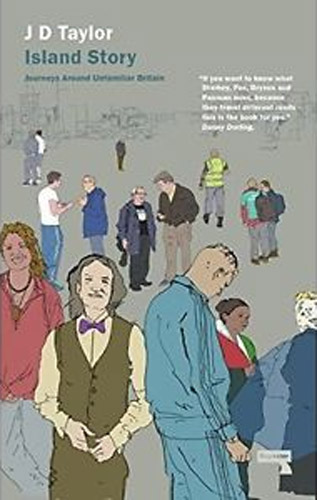
What is life like on this island? With a tent and a rusty bike, J.D. Taylor set off to find out. No other subject has spilt so much ink as Britain today. But whilst assuming a monopoly on national identity, a London-based elite has proven a poor forecaster of the political weather around the island.
Skeptical and inquisitive, Taylor instead cycled all round Britain, interviewing and staying with strangers from all walks of life. Without a map and travelling with the most basic of gear, the journey revels in serendipity and schadenfreude.
Island Story weaves histories, experiences and ideas to tell another kind of story: one of rebellion and retail parks, migration and inertia, pessimism and disappearing ways of life, and a fiery, unrealized desire for collective belonging and power.
Taken from Repeater Books
Posted on March 15, 2017 by The Orwell Prize -

Based on unrivalled access to all the key politicians and their advisors, including Boris Johnson, Michael Gove, George Osborne, Nigel Farage and Dominic Cummings, the mastermind of Vote Leave, Tim Shipman has written a political history that reads like a thriller, and offers a gripping, day-by-day account of what really happened behind-the-scenes in Downing Street, both Leave campaigns, the Labour Party, UKIP and Britain Stronger in Europe.
Shipman gives his readers a ringside seat on how decisions were made, mistakes justified and betrayals perpetrated. Filled with stories, anecdotes and juicy leaks the book does not seek to address the rights and wrongs of Brexit but to explore how and why David Cameron chose to take the biggest political gamble of his life and explain why he lost.
Taken from HarperCollins
Posted on March 15, 2017 by The Orwell Prize -

On Easter Sunday, 23 April 1916, the seven members of the Irish Republican Brotherhood’s military council met to proclaim an Irish Republic with themselves as the provisional government. After a week of fighting with the British army on the streets of Dublin, the Seven were arrested, court-martialled and executed.
Cutting through the layers of veneration that have seen them regarded unquestioningly as heroes and martyrs by many, Ruth Dudley Edwards provides shrewd yet sensitive portraits of Ireland’s founding fathers. She explores how an incongruous group, which included a communist, visionary Catholic poets and a tobacconist, joined together to initiate an armed rebellion that changed the course of Irish history. Brilliant, thought-provoking and captivatingly told, The Seven challenges us to see past the myths and consider the true character and legacy of the Easter Rising.
Taken from Oneworld Publications
Posted on March 15, 2017 by The Orwell Prize -
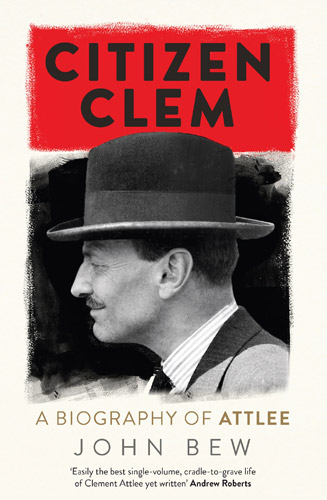
The story of Attlee is also much more dramatic than he himself ever made out – and not without an element of heroism. Here was a man born in the governing class who devoted his life to the service of the poor; who was carried off the battlefield three times in the First World War; who stood shoulder to shoulder with Churchill at Britain’s darkest moment, and then triumphed over him at the general election of 1945. His government of 1945-51 included Ernest Bevin, Herbert Morrison and Nye Bevan and was the most radical in history, giving us the NHS, National Insurance, NATO and the atomic bomb. In many ways we still live in a world of Attlee’s creation. This book will pierce the reticence of Attlee and explore the intellectual foundations and core beliefs of one of the most important figures in twentieth-century British history, arguing that he remains underappreciated, rather than simply underestimated. It will reveal a public servant and patriotic socialist, who never lost sight of the national interest and whose view of humanity and belief in solidarity was grafted onto the Union Jack.
Taken from Quercus
Posted on March 15, 2017 by The Orwell Prize -
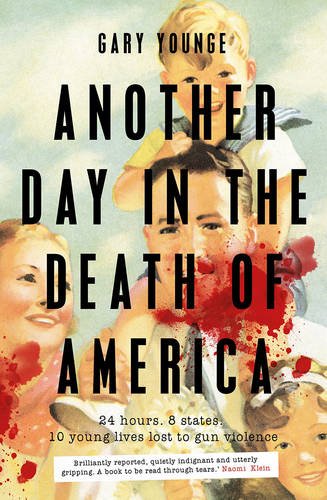
Saturday, November 23rd, 2013. It was just another day in America; an unremarkable Saturday on which ten children and teens were killed by gunfire. The youngest was nine; the oldest was nineteen. White, Black and Latino, they fell in suburbs, hamlets and ghettos. None made the national news. There was no outrage about their passing. It was just another day in the death of America, where on a daily average – seven children and teens are killed by guns.
Younge picked this day at random, searched for their families and tells their stories. The nine-year-old opened the door and was shot in the head by his mother’s ex-boyfriend. The eleven-year-old was killed by his friend at a sleep over in rural Michigan. The eighteen-year-old gang member, on Chicago’s South Side, was shot in a stairwell just days after being released from prison. Through ten moving chapters – one for each child – Younge explores the way these children lived and lost their short lives. He finds out who they were, who they wanted to be, the environments they inhabited, and what this might tell us about society at large.
What emerges is a searing portrait of childhood and youth in contemporary America.
Taken from Faber
Posted on March 15, 2017 by The Orwell Prize -
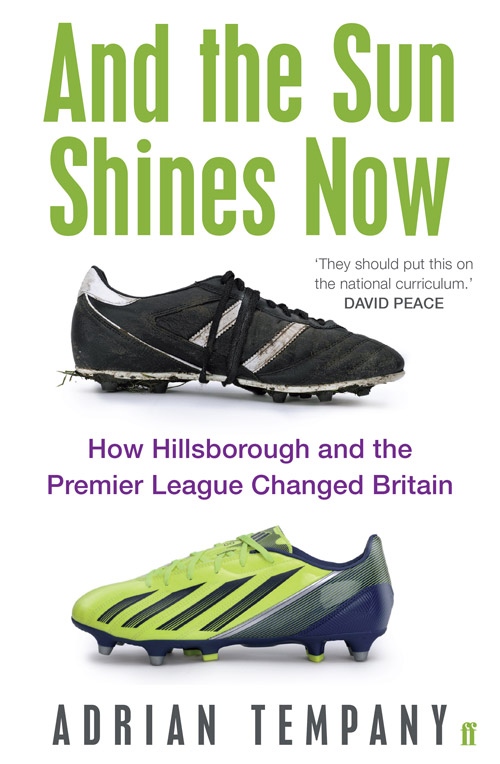
And the Sun Shines Now is a book about why Hillsborough happened, and how the flawed response to the disaster created a ‘whole new ball game’ but destroyed a culture. The Taylor Report. All-seater stadia. Police lies. Political neglect. Murdoch. The oligarchs. And an FA plan to gentrify football. But what happens when you take the people’s game away from the people? What happens to the game, and what happens to the people? Powerful, funny, soulful and brutal, Adrian Tempany’s acclaimed book exposes the real cost of the modern game . . . and the forces that shaped it.
Taken from Faber & Faber
Posted on July 22, 2016 by The Orwell Prize -

Douglas Murray is Associate Director of the Henry Jackson Society and the author of Bloody Sunday: Truth, lies and the Saville Inquiry. @DouglasKMurray
Submitted Articles
Posted on March 7, 2016 by The Orwell Prize -
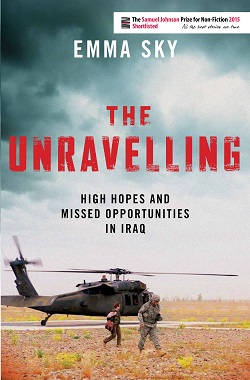
When Emma Sky, an intrepid young British woman, volunteered to help rebuild Iraq after the overthrow of Saddam Hussein, she had little idea what she was letting herself in for. It was only supposed to last three months but instead spanned a decade. As the representative of the Coalition Provisional Authority in Kirkuk and then the political advisor to US General Odierno, Sky was valued for her outspoken voice and different perspectives that she brought due to her knowledge of the Middle East. Since the invasion in 2003, Sky has been a tireless witness to American efforts to transform a country traumatized by decades of war, sanctions and brutal dictatorship; to insurgencies and civil war; to the planning and implementation of the surge and the subsequent drawdown of US troops; to corrupt political elites who use sectarianism to mobilize support; and to the takeover of a third of the country by the Islamic State.
Called the ‘modern-day Gertrude Bell’ by The Times, Sky provides unique insights into the US military, and the complexities, diversity and evolution of Iraqi society. With sharp detail, tremendous empathy and respect for those who served – The Unravelling is an intimate portrait of how and why the Iraq adventure failed despite the best and often heroic efforts of its young men and women on the ground.
Taken from and read more at Atlantic Books.
Posted on March 7, 2016 by The Orwell Prize -
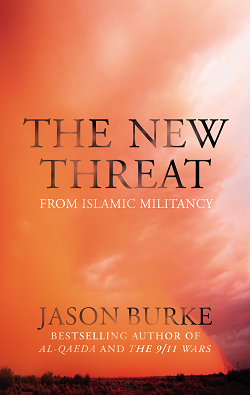
In The New Threat renowned expert and prize-winning reporter Jason Burke provides the clearest and most comprehensive guide to Islamic militancy today.
From Syria to Somalia, from Libya to Indonesia, from Yemen to the capitals of Europe, Islamic militancy appears stronger, more widespread and more threatening than ever. ISIS and other groups, such as Boko Haram, together command significant military power, rule millions and control extensive territories. Elsewhere Al-Qaeda remains potent and is rapidly evolving. Factions and subsidiaries proliferate worldwide, and a new generation of Western Jihadists are emerging, joining conflicts abroad and attacking at home. Who are these groups and what do they actually want? What connects them and how do they differ? How are we to understand their tactics of online activism and grotesque violence?
Drawing on almost two decades of frontline reporting as well as a vast range of sources, from intelligence officials to the militants themselves, renowned expert Jason Burke cuts through the mass of opinion and misinformation to explain dispassionately and with total clarity the nature of the threat we now face. He shows that Islamic militancy has changed dramatically in recent years. Far from being a ‘medieval’ throwback, it is modern, dynamic and resilient. Despite everything, it is entirely comprehensible.
The New Threat is essential reading if we are to understand our fears rather than succumb to them, to act rationally and effectively, and to address successfully one of the most urgent problems of our time.
Taken from and read more at Penguin.
Posted on March 7, 2016 by The Orwell Prize -

The Tears of the Rajasis a sweeping history of the British in India, seen through the experiences of a single Scottish family. For a century the Lows of Clatto survived mutiny, siege, debt and disease, everywhere from the heat of Madras to the Afghan snows. They lived through the most appalling atrocities and retaliated with some of their own. Each of their lives, remarkable in itself, contributes to the story of the whole fragile and imperilled, often shockingly oppressive and devious but now and then heroic and poignant enterprise.
On the surface, John and Augusta Low and their relations may seem imperturbable, but in their letters and diaries they often reveal their loneliness and desperation and their doubts about what they are doing in India. The Lows are the family of the author’s grandmother, and a recurring theme of the book is his own discovery of them and of those parts of the history of the British in India which posterity has preferred to forget.
The book brings to life not only the most dramatic incidents of their careers – the massacre at Vellore, the conquest of Java, the deposition of the boy-king of Oudh, the disasters in Afghanistan, the Reliefs of Lucknow and Chitral – but also their personal ordeals: the bankruptcies in Scotland and Calcutta, the plagues and fevers, the deaths of children and deaths in childbirth. And it brings to life too the unrepeatable strangeness of their lives: the camps and the palaces they lived in, the balls and the flirtations in the hill stations, and the hot slow rides through the dust. An epic saga of love, war, intrigue and treachery, The Tears of the Rajas is surely destined to become a classic of its kind.
Taken from and read more at: Simon & Schuster.
Posted on March 7, 2016 by The Orwell Prize -

We all depend on the finance sector. We need it to store our money, manage our payments, finance housing stock, restore infrastructure, fund retirement and support new business. But these roles comprise only a tiny sliver of the sector’s activity: the vast majority of lending is within the finance sector. So what is it all for? What is the purpose of this activity? And why is it so profitable?
John Kay, a distinguished economist with wide experience of the financial sector, argues that the industry’s perceived profitability is partly illusory, and partly an appropriation of wealth created elsewhere – of other people’s money. The financial sector, he shows, has grown too large, detached itself from ordinary business and everyday life, and has become an industry that mostly trades with itself, talks to itself, and judges itself by reference to standards which it has itself generated. And the outside world has itself adopted those standards, bailing out financial institutions that have failed all of us through greed and mismanagement. We need finance, but today we have far too much of a good thing. In Other People’s Money, John Kay shows, in his inimitable style, what has gone wrong in the dark heart of finance.
Taken from and read more at Profile Books.

















